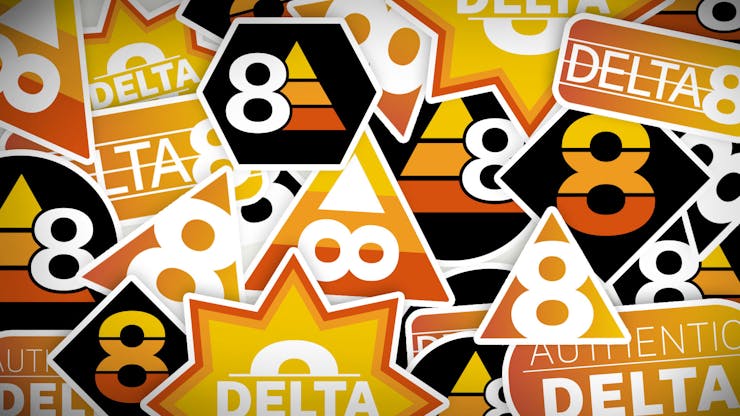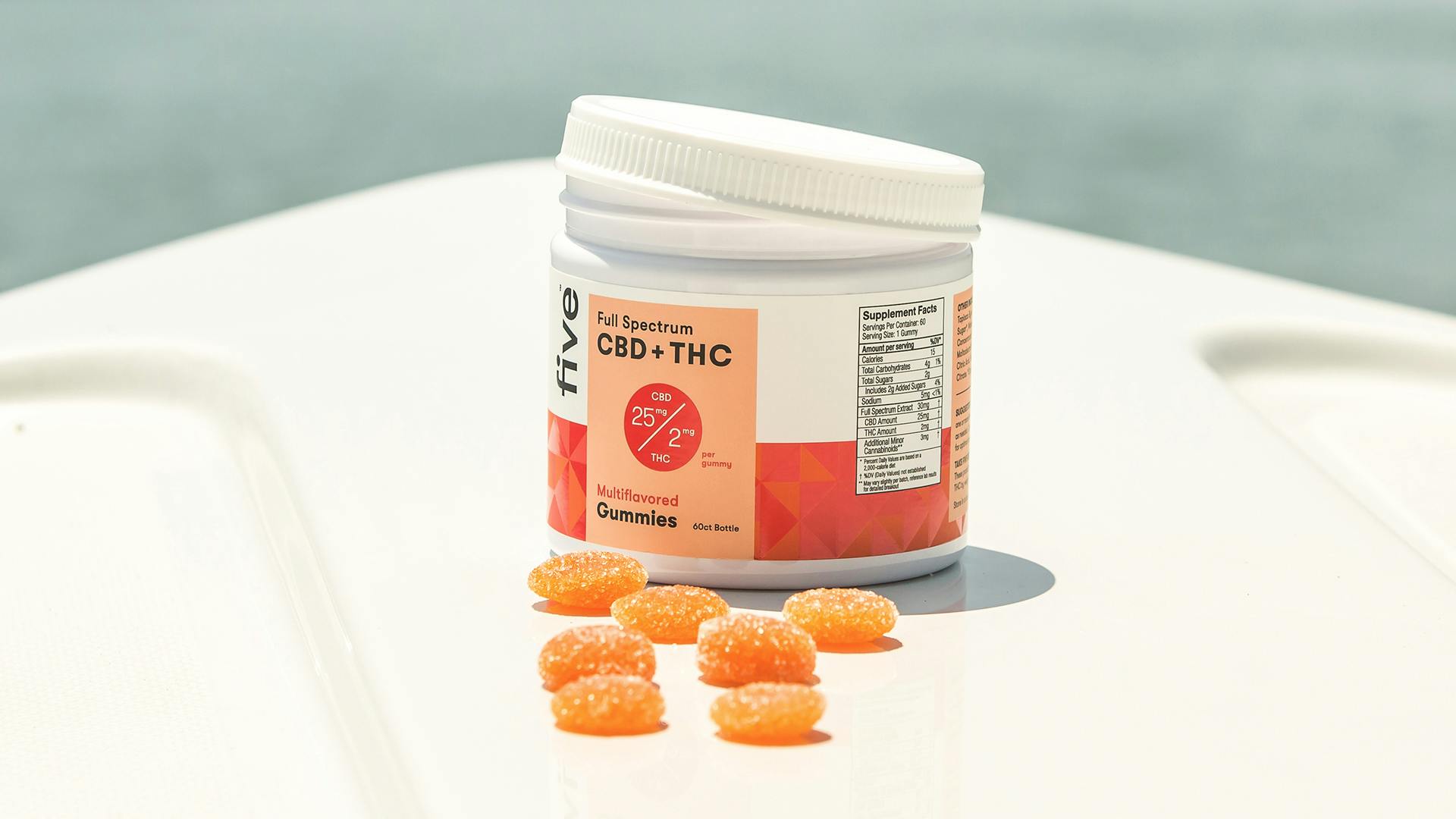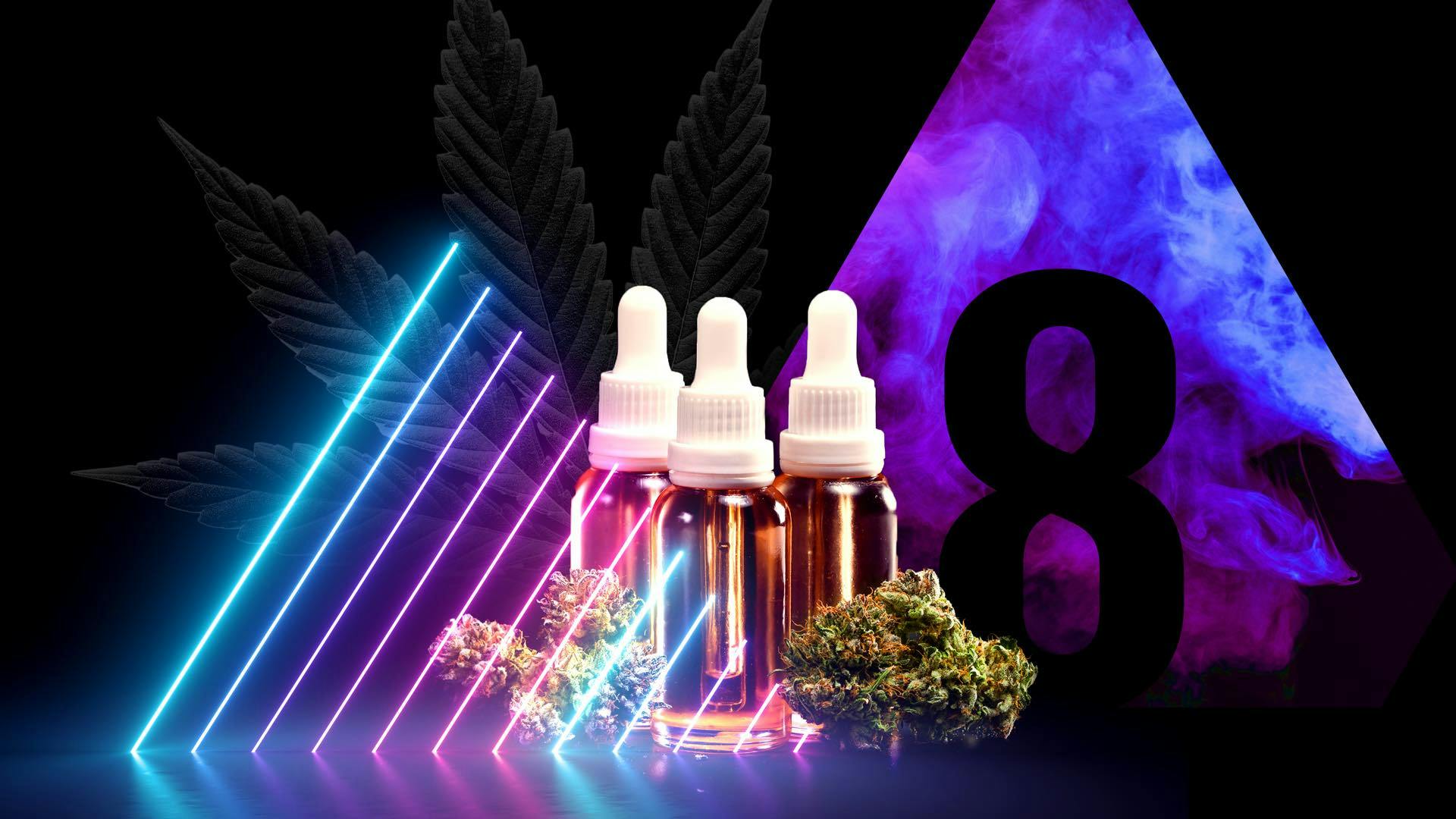In June, Leafly published an article on delta-8 THC products purchased at a smoke shop in Oxnard, CA. Two of the three products turned out to be brandless packages of supposed delta-8 products, with no indication of where they came from. The featured image included a bag of copycat Flamin’ Hot Cheetos infused with delta-8 THC.
Officials at Delta-8 Oils released a statement: ‘Please stop stealing our brand and our logo.’
When Sam Slosburg saw the photo, he was shocked.
Slosburg is the creative director of Delta 8 Oils in Camp Verde, AZ. He recognized a small sticker slapped onto the package of supposedly delta-8 THC-infused Flamin’ Hot Cheetos.
It was his own company’s logo.
But the product wasn’t from Delta 8 Oils. In fact, the seed-to-sale producer doesn’t even make edibles. Nor does the company sell products outside Arizona.
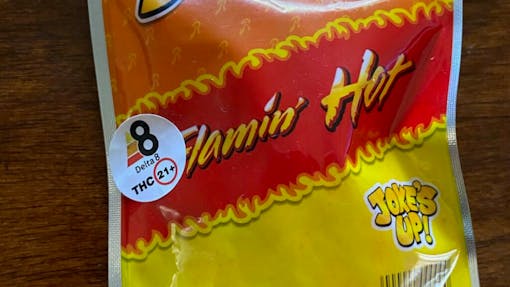
Don’t buy pirated products
Three days after the article came out, Delta 8 Oils released a statement: “To Whom It May Concern: Please Stop Stealing Our Brand and Our Logo.”
“This is wrong on so many levels,” the statement read. “If you see a product for sale with our logo outside a licensed Arizona dispensary, it ain’t us.”
The sticker bearing the Delta 8 Oils logo was placed on several edibles being sold at the Southern California smoke shop 500 miles away.
What else was on the packs of chips and candies? Not a whole lot. There was no testing information, no information about the manufacturer, no product safety assurance whatsoever.
“Our license allows us to sell only in the state of Arizona, only to licensed (cannabis) dispensaries,” Slosburg said. “Everything we’re doing is to be the trusted delta-8 source.” About the fake Cheetos, Slosburg said: “Just like anything, you probably don’t want to put it in your body if you really don’t know where it came from.”
How can businesses protect their brands?
Delta 8 Oils is now pursuing state trademark protection, Slosburg said, but the company’s legal team has told him a federal trademark is likely not possible.
Federal trademark officials refuse to protect delta-8 products. That leaves legitimate companies with little recourse.
As Leafly has learned, the U.S. Patent and Trademark Office (USPTO) is now handling delta-8 products the same way it’s dealt with state-licensed cannabis for years. The USPTO prohibits businesses in these industries from trademarking their products.
Cannabis companies have gotten around this obstacle in the past, at least in part, by seeking brand protection for ancillary products like lighters or clothing. That’s about the best they can do currently, at least at the federal level, said Neil Juneja, a Seattle-based trademark attorney who specializes in cannabis law.
But it’s a tricky and far-from-foolproof process—one even the biggest names in cannabis still struggle with.
Popular brands are hit hard
Brand theft is nothing new in the industry. Cookies, the highly regarded California-based cannabis brand, is especially popular among logo thieves, who wrap cut-rate, untested, and potentially toxic products in counterfeit “Cookies” packaging and sell them on the illicit market.
Now, with the sudden popularity of delta-8 THC products, the logo thieves have invaded that space, too.
And as Delta 8 Oils company officials discovered, stopping the scammers isn’t easy. In fact, the federal government’s trademark policies are encouraging pirate manufacturers to cheat delta-8 consumers nationwide—and put the public’s health at risk.
Trademarks protect consumers more than companies
Cannabis can only be legally sold through state-licensed dispensaries where the drug is legal. Delta-8 THC products, on the other hand, can be sitting on the shelf of just about any store, with the exception of a few states that have moved to ban it. (For more about the complicated legal status of delta-8, see Leafly’s comprehensive delta-8 guide.)
“We have to look at the purpose of trademarks,” Juneja said. “The purpose is not to protect companies. It’s to protect consumers.”
“That’s what we really need to tell consumers: You know this brand, you know this trademark, and you know the quality of the product coming from us,” Juneja added.
“We just don’t have enough tools to enforce it in this gray market right now,” he said, referring to the cannabis space.
“It’s the consumer that hurts the most.”
Schedule I drug products can’t be trademarked
Upon discovering the copycat logos earlier this summer, officials with Delta 8 Oils decided to apply for trademark protection from the state of Arizona.
A state-authorized trademark would protect the company’s logo at least within the borders of Arizona, giving the brand “a small amount of protection,” Slosburg said. And state trademarks are available in Arizona because cannabis is legal according to state law.
State trademarks are available, but federal trademarks aren’t. So pirates simply operate in other states.
But a federal trademark—which would protect Delta 8 Oils against the copycats in California and elsewhere—is a different story.
The main barrier to federal trademark protection is this: Any substance categorized as a Schedule I drug cannot be trademarked by the U.S. Patent and Trademark Office (USPTO).
CBD products can receive federal trademark protection, with a few exceptions, as the U.S. Patent and Trademark Office made clear in May 2019. That’s because CBD is not a Schedule I substance. When it’s derived from hemp (cannabis with less than 0.3% delta-9 THC), CBD is federally legal.
Delta-8 THC or simply “delta-8,” has exploded in popularity in the past year because it appeared to be federally legalized, like CBD, through the language of the Agricultural Improvement Act of 2018, also known as the 2018 farm bill. Infused into edibles and vape cartridges, it started surfacing in smoke shops and gas stations in hard-line prohibition states like Texas, and even in states like California where legal state-licensed weed is legal.
But are delta-8 THC products really Schedule I?
Many have read the 2018 farm bill language to mean that delta-8 THC is federally legal so long as it was derived from CBD that was itself derived from hemp.
Production of delta-8 THC is a two-step process. CBD is first extracted from hemp, and then delta-8 THC is distilled from that CBD. This leads to a sort of “fruit of the untainted tree” legal argument, which holds that so long as each product in the processing chain is legal, the end product (delta-8 THC) must be legal too.
But the U.S. Drug Enforcement Administration (DEA) recently moved to counter that argument.

DEA’s July 2021 update
While delta-8 products continue to be sold in both licensed dispensaries and unlicensed stores nationwide, the federal agency’s July 2021 guide to drug classifications specifically lists it as a Schedule I drug—treating it more like cannabis and traditional delta-9 THC, not CBD.
Tetrahydrocannabinols, including delta-8 THC, are labeled as Schedule I controlled substances in the 102-page booklet. However, when we contacted the DEA, the agency reiterated that the proposed rule to categorize delta-8 as a Schedule 1 substance is not yet final (as we previously reported).
“As DEA is currently undergoing the rulemaking process regarding the implementation of the Agriculture Improvement Act … we would be unable to comment on any impact in legality of tetrahydrocannabinols, delta-8 included, until the process is complete,” a DEA spokesperson wrote in an email.
“We are in the process of reviewing thousands of comments and do not speculate on what could happen as a result,” the email continued.
Trademark office is making the call on its own
So it appears delta-8 THC isn’t a Schedule I substance—yet.
Even so, officials at the U.S. Patent and Trademark Office have apparently leaped to their own conclusions. They’re already treating delta-8 products as if they are Schedule I substances. It’s unclear on what authority they’re basing that decision.
“Delta-8 THC products are considered Schedule I drugs, so to that extent, what is in the TMEP applies,” USPTO spokesperson Mandy Kraft wrote in an email, citing a manual from the agency that states Schedule I substances are subject to trademark application inquiries or outright refusal.
The manual goes on to state that a refusal must be made if there’s evidence that the product seeking trademark protection is federally illegal. Given what the USPTO has told us, that would be the case for delta-8 THC products—if the DEA’s proposed rule was actually in effect. But it isn’t.
There seems to be no recourse for companies like Delta 8 Oils that are trying to do the right thing and play by the rules. A delta-8 company applying for trademark protection could sue the USPTO in federal court, of course, but such an action would be costly and could take years to resolve.
In the meantime, it appears that federal trademark protection is not in the cards for delta-8 THC manufacturers.
And that could have a major impact on product safety.
How the trademark office rewards thieves
Chemists and insiders in the cannabis industry have been sounding the alarm about the few, if any, regulations that govern sales of delta-8. As one cannabis scientist told Chemistry and Engineering News last month, products can contain “a soup” of potentially harmful byproducts and unknown compounds, depending on the chemical processes used.
However, the DEA’s proposal to categorize delta-8 as a Schedule I controlled substance would do little to help the situation—at least when it comes to the federal trademarking process. That’s because delta-8 companies now face the same issue state-licensed cannabis brands have faced for years: It’s nearly impossible to protect their names and logos against copycat fraudsters.
In other words, the federal government is allowing the legal sale of a product and then tying the hands of above-board companies—who follow regulations and test their products—when they try to protect their brands.
In effect, the U.S. Patent and Trademark Office is punishing delta-8 companies that respect consumers and rewarding companies that cheat them.
A common counterfeit: Cookies pirated as ‘Cake’ or ‘Bake’
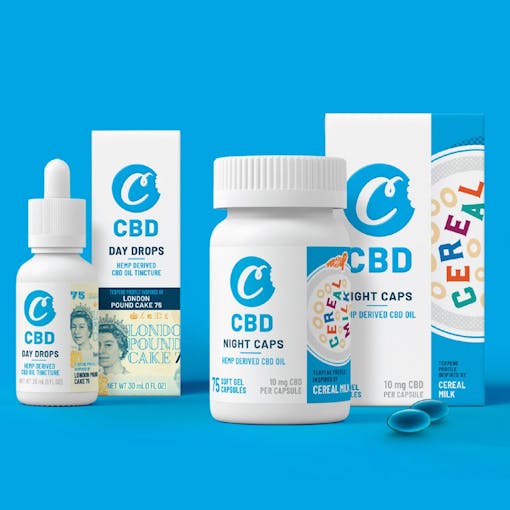
As counterfeit products spread, the responsibility for finding them and warning the public has fallen on media outlets, bloggers, and the industry itself. Sean Zadoorian, editor-in-chief of the vaping website Vapor Vanity, said the brand that appears to get ripped off the most is Cookies, a giant in the legal state-licensed industry.
Zadoorian said the biggest copycat is “Cake,” a company-less packaging design Leafly came across earlier this summer.
“It’s mainly being sold in gas stations and whatnot, like convenience stores, retail shops,” Zadoorian said. “Generally speaking, this ‘brand’ is on the street, and the logo, the branding and all that look very, very similar to Cookies—but using the word ‘cake.’”
“That’s the biggest example we found,” he said, citing other designs like Bakethat appear to mimic Cookies.

A workaround: TM the t-shirts and lighters
Cookies has a reported worth of half a billion dollars, according to a Forbes feature last year, with the company’s flagship store in LA often bringing in up to $450,000 in a single day. But the company has more going for its brand protection than just a whole lot of money to hire lawyers.
The popular brand Cookies found a workaround: Trademark the company’s logo on t-shirts.
It has protected its good name by acting early and doing exactly what most cannabis intellectual property lawyers advise: trademark other merchandise within the same brand.
“This, so far, is the lone [legal] avenue cannabis businesspeople have to protect their products from pretenders and fakers—and this is exactly what Berner (the rapper/ entrepreneur behind Cookies) did in 2013, registering ‘Cookies SF’ as a trademarked maker of sweatshirts and T-shirts,” reads a 2016 SF Weekly feature on the Bay Area company.
But that hasn’t stopped a whirlwind of potentially toxic counterfeits.
Feds crack down on counterfeit vapes after deadly outbreak
Cookies was among the most widely mimicked brands on the illicit market in 2019, at the height of the outbreak of vaping-related lung injuries that sickened thousands of Americans and killed at least 68.
These days, federal law enforcement seems to be taking better notice of counterfeit products that mimic Cookies and other big-name brands, which end up getting filled with potentially toxic materials on the street market.
“When shipments come into the country … Customs does random checks. And as a result of a random check, they see some packages that look suspicious, or items that look suspicious,” said Elliott Brown, an intellectual property attorney who represents Cookies in the company’s trademark pursuits.
“They will reach out to us and say, ‘Hey, there’s somebody here, trying to import several hundred products that we think may be counterfeit. Please let us know if they are counterfeit or authentic,’” continued Brown.
Customs catching fake vape imports
Since the deadly outbreak in 2019, Customs agents have seized shipments of thousands of counterfeit vapes in cities such as Pittsburgh, Chicago, and Atlanta, to name just a few over the past year.
In April, the U.S. Department of Justice arrested 23-year-old Texas resident Christopher Andrew Reyes after the U.S. Customs and Border Protection seized a shipment of 2,400 vaping cartridges from China addressed to him, federal officials said. He faces up to three years in federal prison. The label? Fake “Cookies,” according to federal officials.
“The distribution of these black-market vaping devices is not only illegal, but could prove lethal to those who consume vape materials from unregulated sources,” Homeland Security Special Agent Ryan L. Spradlin said in a statement from the federal agency.
What did it take for feds to act? Dozens of deaths
It appears federal agents started making mass seizures of counterfeits only after thousands of Americans suffered severe lung injuries, sometimes ending up hospitalized and hooked to ventilators.
It’s a sad reality that may have been prevented if cannabis brand pirates weren’t allowed to run free. And it’s a problem that will now extend to the delta-8 industry as the USPTO also prohibits those companies from protecting their brands at a national level.
